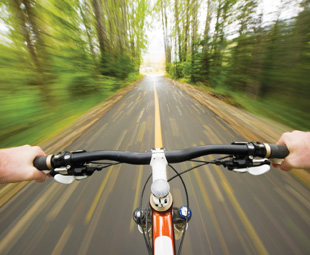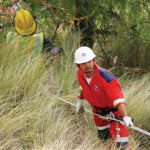Re-cycle your transport

The bicycle is an environmentally-friendly mode of transport that spends most of its life locked in South Africans’ garages. But as Louis de Waal, founder and chairman of the Bicycling Empowerment Network, points out, it could be the solution to many a problem.
With World Environment Day happening on June 5, strong calls for people to “kick the carbon habit” are being heard. Global citizens will be encouraged to use more public transport, adopt a low carbon lifestyle and maybe even celebrate by riding to work in an organised parade.
The bicycle is but one part of a multi-faceted solution we can take advantage of beyond the festivities of the day. Of course, it alone won’t solve our energy problems. It’s not going to make South Africa independent of foreign oil, resolve the climate change situation, dissolve air pollution, recreate urban vibrancy or clear traffic congestion. In our sprawling, low-density cities, built for speed and segregation, the bicycle is also unlikely to become the primary mode of daily transport.
Happily, the bicycle is gaining traction among the urban “cool” and is at last being acknowledged by public sector strategists and planners. But until bicycle planning becomes less of an “if there’s space” option and more of a fully-networked, uncontested mainstream intervention, this low-carbon transport mode will remain at the margins of transportation for those willing to take their chances with motorised traffic.
While emissions are growing rapidly in South African cities as the use of private cars increases, movement by bicycle generates no air or noise pollution. An increase in non-motorised transport could be critical to slowing climate change, reducing upper respiratory and cardio-vascular disease, and reducing sleep disorders. It would also contribute to social equity (not to mention facilitating lessons in those virtues much-needed in the 21st century: patience, tolerance and empathy).
In addition, bicycles are more efficient users of space. They use less than a third of the road space used by private cars – and take up 15 times less space for parking! Cycling is the most affordable, accessible, efficient and environmentally sustainable means of making short trips. Many trips to the shops, friends, the beach or the rail station are less than five kilometres. Forget driving – ride!
Yet millions of bicycles lie in garages, scorned as a mode of transport and operated only as sports equipment.
South Africa has significant potential to become a cycling country. Not only does national policy support bicycle transport, but by and large we have good weather and a population that enjoys sport and exercise. Every March, 35 000 cyclists enter the Cape Argus/Pick n Pay Cycle Tour in Cape Town, but few become bicycle commuters when the tour is over.
Most cyclists reason that it’s too dangerous to ride on our roads because of the volume of motorised traffic and aggressive, entitled motorists. Long travel distances, urban sprawl, and our cities’ lack of coherent bicycle infrastructure – including secure bicycle parking and prohibition of bicycles on most modes of public transport – don’t help either.
Encouraged by the large numbers of bicycle commuters in wealthy European cities (in Copenhagen, some 38 percent of all trips are made by bicycle), South African bicycle advocates and planners have focused on these cities’ high-quality bicycle lanes as the intervention we need most. In South Africa, private cars and bicycles are defined in law as “vehicles”, and the same road rules apply to both.
Can anyone argue with a mode of transport that encourages equitable use of road space and public resources, is available to almost anyone, facilitates personal mobility, has low-carbon and low-environmental impact, is cheap, low-maintenance, portable and convenient, easily integrates with public transport, leads to tolerance, patience as well as personal and environmental good health, and that’s almost guaranteed to get you to your destination in a good mood? The bicycle won’t solve all of the world’s problems, but it could very well solve some of yours.


